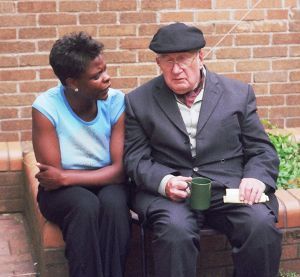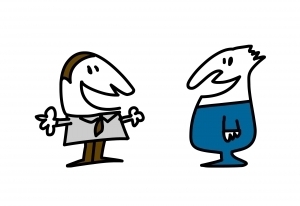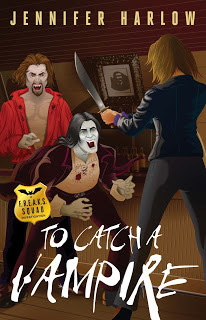Beth Groundwater's Blog, page 28
September 17, 2012
Naming Characters After Real People
I'm blogging at Inkspot, the blog for Midnight Ink authors, today about the only times I name characters after real people. It's when they make the winning bid on a character name in an upcoming novel of mine in a silent or live auction for a literacy-related charity that most mystery fan conferences conduct.
Please read my post to learn about the fun I had with the latest two character names. Also, if you've ever had a character named after you in a mystery novel, please tell all! What did you think of the experience?
Please read my post to learn about the fun I had with the latest two character names. Also, if you've ever had a character named after you in a mystery novel, please tell all! What did you think of the experience?
Published on September 17, 2012 04:00
September 14, 2012
Dialogue Lessons: Mechanics, Part 3

As promised last Friday, during the rest of September I'll be sharing some notes here from my "The Art of Writing Dialogue" workshop that I've presented to many writing groups. I presented the first two lessons on Mechanics, the nitty gritty little details of writing dialogue, earlier this week. The last of three lessons on Mechanics will be today, with the final five "rules of thumb." Over the next two weeks, I'll go into the Big Picture, using character traits, conflict, and emotion to infuse a real-life feel into dialogue, to make it pop off the page. On to more Mechanics:
12. Italicize foreign language words in dialogue and use the proper diacritical marks.
13. Avoid informational dialogue by bringing in an ignorant character who has to be told everything, by putting the information in a thought or narrative, or by some other means.
14. Avoid direct address except when it is needed for emphasis, such as when a mother screams a child’s full name when he’s in trouble. Usually, direct address seems unnatural or stilted.
Bad: “Please hand me that poker, Mary,” John said as he knelt by the hearth.
“Okay, John. Here.” Mary peered at the fire. “Aren’t you a little close, John?”
Good: John knelt by the hearth. “Please hand me that poker.”
“Here.” Mary peered at the fire. “Aren’t you a little close?”
15. Have your characters ask and answer questions one at a time, so the reader doesn’t get confused.
Bad:
“Where are Tom and Sally? Weren’t they supposed to be here? And is Jane supposed to be here?”
“Tom and Sally are at the mall, and no, I didn’t invite them. Of course she’s supposed to be here. Why’d you ask?”
Good: (This would be even better with some business and tags added.)
“Where are Tom and Sally?”
“They’re at the mall.”
“Weren’t they supposed to be here?”
“No, I didn’t invite them.”
“And is Jane supposed to be here?”
“Of course she’s supposed to be here. Why’d you ask?”
16. Try not to switch more than once or twice between dialogue and narrative in the same paragraph, because then the dialogue gets lost. Make sure there’s more dialogue than narrative in a paragraph that combines the two, for the same reason. If you need to, pull the narrative out of the dialogue paragraph.
Bad:
“Looks like he’s unconscious,” Mandy shouted to the woman. “I’m going to need your help pulling him in.” The woman shot her a wild-eyed "What, are you kidding?" look, but Mandy chose to ignore it. The ominous roar of Number Five downstream was way more important. Powering her oar strokes with her back, Mandy yelled out explanations. “I’ll come up alongside him then pull him onto the other pontoon. I need you to grab whatever you can on him and help pull him up.”
Good:
“Looks like he’s unconscious,” Mandy shouted to the woman. “I’m going to need your help pulling him in.”
The woman shot her a wild-eyed "What, are you kidding?" look, but Mandy chose to ignore it. The ominous roar of Number Five downstream was way more important.
Powering her oar strokes with her back, Mandy yelled out explanations. “I’ll come up alongside him then pull him onto the other pontoon. I need you to grab whatever you can on him and help pull him up.”
(This final example was taken from my Deadly Currents mystery. I doctored the Good version in the book to come up with the Bad version.)
Published on September 14, 2012 04:00
September 12, 2012
Dialogue Lessons: Mechanics, Part 2

As promised last Friday, during the rest of September I'll be sharing some notes here from my "The Art of Writing Dialogue" workshop that I've presented to many writing groups. I presented the first lesson on Mechanics, the nitty gritty little details of writing dialogue, on Monday. The second of three lessons on Mechanics will be today, with the next six "rules of thumb."
6. Don’t let your characters give speeches to each other. The dialogue should flow back and forth in a natural give and take. If a dialogue paragraph is more than three lines long, it’s probably too long. Insert a question or reaction remark from the other character in the middle to break it up. You may find that one of the middle sentences of the speech can be reworded into a question from the other character.
7. Remember that people breathe while speaking, so insert natural breaks (pauses, commas, periods, actions) where your characters would take a breath. If a phrase is too long for you to say out loud without taking a breath, break it up.
8. Don’t have a string of more than five dialogue paragraphs in a row without a tag. At that point, the reader gets confused about who is saying what, even if just two characters are talking. If more than two characters are conversing, you’ll likely need to tag almost every line of dialogue.
9. Be careful with pronouns. If two women are speaking, ‘she’ is not a helpful tag. If two women and two men are speaking, neither ‘he’ nor ‘she’ is helpful, so you will have to use names or other identifiers, such as "the tall woman" and "the chubby old man."
10. Try to avoid awkward tags after question marks or exclamation marks.
Bad: “What is that dog doing?” John asked.
Good: John pointed. “What is that dog doing?”
Bad: “Watch out!” Jill yelled.
Good: Jill tensed. “Watch out!” or “Watch out,” Jill yelled.
11. Leave out the qualifiers, stammers, and pause words that people use in everyday speech, but that don’t move the story forward.
Bad: “Well, um, I don’t know if I should. Like, would you?”
Good: “I don’t know if I should. Would you?”
Published on September 12, 2012 04:00
September 10, 2012
Dialogue Lessons: Mechanics, Part 1

As promised last Friday, during the rest of September I'll be sharing some notes here from my "The Art of Writing Dialogue" workshop that I've presented to many writing groups. After establishing some common ground with definitions Friday, here's the first lesson on Mechanics, the nitty gritty little details of writing dialogue. I'll present sixteen "rules of thumb" in this Mechanics section, the first five of which I'll cover today.
1. Put each character’s dialogue and/or actions in separate paragraphs (such as the four separate paragraphs below).
“Watch what you’re doing,” Jake shouted.
Becky cringed. “Sorry about that.”
“That’s okay,” Jake said. “Just do better next time.”
Becky carefully put the vase back on the shelf.
2. Separate the dialogue from character tags with commas, unless a new sentence begins after a tag (see above).
Bad: “Hang onto the raft”, yelled Mandy to the woman.
“Okay.” The woman said. “but I don’t know how long I can”.
Good: “Hang onto the raft,” Mandy yelled at the woman.
“Okay,” the woman said, “but I don’t know how long I can.”
3. Stick mostly with three basic speaking verbs (said, asked, replied/answered) and sparingly use some that indicate volume (whispered, murmured, shouted, yelled). Use ‘said’ most of the time, because readers’ eyes are trained to skip it. Only use ‘hissed’ if what’s being said contains S’s.
Bad: “You fool,” Gregorio hissed.
Good: “You stupid ass,” Gregorio hissed.
4. Avoid animal sounds (growled, chirped, tittered, croaked) and other weird speech tags (opined, blustered, mused, cried, orated). And don’t substitute a non-speech word for ‘said’ in a tag.
Bad: “You’re looking mighty fine tonight,” he leered.
Good: He leered at her. “You’re looking mighty fine tonight.”
5. Put the tag as close to the beginning of the dialogue line as you can, where the first comma or period would appear, so the reader knows who is speaking as soon as possible. Also, if emotion is expressed in the tag, that will "flavor" the speech that follows.
Bad: “You are a moron, an absolute moron. I’m surprised you know which foot to put your shoe on in the morning,” Robert said with a sneer.
Better: “You are a moron,” Robert said with a sneer, “an absolute moron. I’m surprised you know which foot to put your shoe on in the morning.”
Best: Robert sneered. “You are a moron, an absolute moron. I’m surprised you know which foot to put your shoe on in the morning.”
Published on September 10, 2012 04:00
September 7, 2012
Dialogue Lessons
 I will be doing a fair amount of traveling in September, so I made the decision not to have guests on my blog for the rest of the month because promoting and managing their posts will be difficult. Don't worry, though. I have a full slate of guests lined up for October! In the meantime, I thought I'd share some notes from my "The Art of Writing Dialogue" workshop that I've presented to many writing groups. I hope my blog readers who are writers find these posts to be useful, and I hope my blog readers who are readers will gain an appreciation for how difficult dialogue can be to write.
I will be doing a fair amount of traveling in September, so I made the decision not to have guests on my blog for the rest of the month because promoting and managing their posts will be difficult. Don't worry, though. I have a full slate of guests lined up for October! In the meantime, I thought I'd share some notes from my "The Art of Writing Dialogue" workshop that I've presented to many writing groups. I hope my blog readers who are writers find these posts to be useful, and I hope my blog readers who are readers will gain an appreciation for how difficult dialogue can be to write. I'll start with definitions today, so we're all on the same page:
Dialogue – A conversation between characters in a narrative. It can and should include thoughts, emotions, actions, gestures, facial expressions and more in addition to speech.
Dialogue tag - A noun or pronoun identifying the person speaking and a speech action verb (said, asked, replied, shouted, etc.). Also called an attribution or identifier. It should always be written with the noun first and verb second.
Talking Heads – When a passage of dialogue contains just speech ping-ponging back and forth between characters and not much else.
Informational Dialogue – When two characters who already know something still tell each other about it, as a clumsy device to give the reader the information.
“As you know, Betsy, our mother is sixty-four.”
“Yes, and our brother Bill was born three years after I was.”
Direct Address – When one character calls another one by name within the dialogue.
Salt and Pepper – The boring bits of dialogue that we use in everyday life, such as “Hello, how are you?” or “Please pass the salt and pepper.” that should be left out of fiction dialogue.
Business – The narrative, thoughts, gestures, actions, facial expressions, and so on that flavor dialogue, giving it emotional context and revealing the characters’ motives and conflicts in more depth than words alone can convey.
That's it for today! Tune in next week for some how-tos on Mechanics, the nitty gritty little details of writing dialogue.
Published on September 07, 2012 04:00
September 4, 2012
Today's Mystery Author Guest: Jennifer Harlow

As promised yesterday, fellow Midnight Ink mystery author Jennifer Harlow is visiting my blog today. To read her bio and see her photo, please page down to yesterday's post.
The photo above is the cover for her new release this week, To Catch a Vampire, the second book in her F.R.E.A.K.S. Squad Investigation series. In the book, Beatrice Alexander, telekinetic special agent, is still adjusting to life among the F.R.E.A.K.S. while wiping out zombies and other supernatural threats. When Bea learns about her "special assignment" investigating a series of human disappearances with Oliver Montrose, her gorgeous but annoying vampire co-worker, she reluctantly agrees to go undercover. Disguised as a married couple, they infiltrate the gothic vamp scene in Dallas. While sniffing out clues, Oliver's convincing public—and not so public—displays of affection have Bea swooning in her bustier and fishnets. Between contending with her fake husband's ex-lover Marianna and feeling guilty for hiding the mission from her werewolf crush Will, Bea discovers she's not the only F.R.E.A.K. keeping secrets. Clubbing with the undead turns bloody when Oliver's old enemy, the Lord of Dallas, decides to seek his revenge. Caught in the crossfire, Bea is up to her neck in blood-sucking trouble.
This sounds like a really fun read! Below is Jennifer's guest article about her love for libraries. Please feel free to tell us about your favorite library or to ask Jennifer a question in the comments.

For the Love of LibrariesJennifer Harlow
Reading is in my blood. Both my parents are huge readers. In a week they go through a book a day. I can't remember a single week in my whole life where they haven't had a book in their hands. Every night before I went to bed as a child one or the other read at least two stories to me. (Did I mention that my parents are awesome? Well, they are.) I got this "reading" gene big time. The story goes that when I was four Mom was reading to me, and she noticed I was mouthing the words before she said them. She handed me the book and I started reading to her. I haven't stopped since. On rare days when I have nothing to do I have been known to read three books in that one day. They're usually James Patterson's, but I still count them. So libraries were a big part of my childhood and still are today. I Heart Libraries.
The first time I realized this I was eight. We were living in Sterling, Virginia at the time and they just built this new library. I was going through my classic movie monsters phase, as we all do, and they had all these kid books about them! Here was this magical building that gave me what I wanted. For free! I could get as many as I could carry. I loved this place so much I even volunteered for special programs like animal shows and reading to little kids, well littler than me. (I was eight so I mostly handed out programs to people walking in, but still.) It only lasted a short time because, you know, elementary school got in the way. But Mom would still take me at least once a week to get my fix.
As the years progressed, and we moved around even more (I'm at an even dozen now), I had to find some sort of lifeline. Something that could stay consistent in a crazy world. Libraries provided that. The location might change but their services and the books stayed the same. When I went to college the third thing I did after moving into my dorm and finding the dining hall was to hot-tail it to the library, sit down at a table, and read. The strum and drang inside my head faded away surrounded by all those books. It was as close to home as I could get.
I wrote my books in libraries too. If you're so inclined to stalk me check out the Acknowledgments section of the first book in my F.R.E.A.K.S. Squad Investigation series, Mind Over Monsters . Those are my usual haunts. I just sit down at a table or study carrel, put on my headphones, and write. It gives me a place to focus on the task at hand. (And on occasion shoot flirty looks at cute guys.) Libraries are a safe place to do research, be quiet, and find my next mental adventure. So imagine my glee when I came in to work on my next novel and found my own book on the shelves. Even better when an hour later I went to see it and the book was gone and one of the librarians I know winked at me as I passed. So yes, I love libraries and the people who work in them. Always have, always will. They make what I do possible (and give me a free fix of my drug of choice).
So support your local library. Volunteer. Donate books. If you see programs getting cut due to budget problems, speak out. Viva la biblioteca revolucion!
Published on September 04, 2012 04:00
September 3, 2012
Tomorrow's Guest: Jennifer Harlow

Tomorrow, fellow Midnight Ink mystery author Jennifer Harlow will be a guest on my blog.
Jennifer spent her restless childhood fighting with her three brothers and scaring the heck out of herself with horror movies and books. She grew up to earn a degree at the University of Virginia which she put to use as a radio DJ, crisis hotline volunteer, bookseller, lab assistant, wedding coordinator, and government investigator. Currently she calls Northern Virginia home but that restless itch is ever present. In her free time she continues to scare the beejepers out of herself watching scary movies and opening her credit card bills.
In her guest post tomorrow, Jennifer Harlow talks about why she loves libraries, and I'm sure you'll be intrigued by what she has to say. Then, feel free to ask her some questions in the comments.
Published on September 03, 2012 04:00
August 30, 2012
Buying Readership
A recent New York Times article described how Todd Rutherford started a company, GettingBookReviews.com (now defunct), to collect money from self-published authors in exchange for generating positive 5-star reviews on Amazon for their books--sometimes hundreds of reviews. And the "reviewers" that he paid to write those reviews usually never read the books. Also, the NYT piece quotes Mr. Bing Liu, a data mining expert, who "estimates that about one-third of all consumer reviews on the Internet are fake."
One self-published author who paid for 300 of those positive reviews is none other than John Locke, who is widely touted as a successful self-published writer and who has published a book on How I Sold 1 Million eBooks in 5 Months! However, nowhere does he say in that book that he bought reviews. Also, part of his payment to GettingBookReviews.com included compensating the reviewers for buying their copies of his books (that they didn't read) on Amazon. So, he was paying people to buy his books!
And you know what? It worked. People were sucked in by all those positive reviews and bought his books. He made a boatload of money.
And I, who stick to the high road, who has never paid for a review or paid someone to purchase my book on-line, haven't.
My mystery novels have received positive reviews from all four of the "big four" established review publications (Booklist, Kirkus Reviews, Library Journal, Publishers Weekly), none of which I paid for or even asked for. And my books have received positive reviews from ethical independent reviewers such as Kevin Tipple and Lori Caswell, again which I have not paid for.
Locke admits to buying reviews because "Reviews are the smallest piece of being successful, but it's a lot easier to buy them than cultivating an audience."
And cultivating an audience is what I've been working VERY hard at for many, many years. It's enough to make an honest author weep in frustration.
What can YOU do about this scandal? First, if you enjoyed reading a book by your favorite author, write a heartfelt positive review for it and post it on Amazon, Barnes & Noble, Goodreads, or wherever YOU go to for on-line customer reviews. Help raise the percentage of real, honest reviews on-line. Second, take on-line customer reviews of books, especially on Amazon, with a sizable grain of salt. Compare them to reviews from professional reviewers. Look at what else those customer reviewers have reviewed and if they've ever given a review for a book that's less than 5-stars.
Educate yourself! Hopefully, a side benefit will be that you won't be taken in by fake rave reviews and you won't waste your money on bad books. There are plenty of good books to go around. I hope you'll include mine in your list:
A Real Basket Case
To Hell in a Handbasket
Deadly Currents
Wicked Eddies

One self-published author who paid for 300 of those positive reviews is none other than John Locke, who is widely touted as a successful self-published writer and who has published a book on How I Sold 1 Million eBooks in 5 Months! However, nowhere does he say in that book that he bought reviews. Also, part of his payment to GettingBookReviews.com included compensating the reviewers for buying their copies of his books (that they didn't read) on Amazon. So, he was paying people to buy his books!
And you know what? It worked. People were sucked in by all those positive reviews and bought his books. He made a boatload of money.
And I, who stick to the high road, who has never paid for a review or paid someone to purchase my book on-line, haven't.
My mystery novels have received positive reviews from all four of the "big four" established review publications (Booklist, Kirkus Reviews, Library Journal, Publishers Weekly), none of which I paid for or even asked for. And my books have received positive reviews from ethical independent reviewers such as Kevin Tipple and Lori Caswell, again which I have not paid for.
Locke admits to buying reviews because "Reviews are the smallest piece of being successful, but it's a lot easier to buy them than cultivating an audience."
And cultivating an audience is what I've been working VERY hard at for many, many years. It's enough to make an honest author weep in frustration.
What can YOU do about this scandal? First, if you enjoyed reading a book by your favorite author, write a heartfelt positive review for it and post it on Amazon, Barnes & Noble, Goodreads, or wherever YOU go to for on-line customer reviews. Help raise the percentage of real, honest reviews on-line. Second, take on-line customer reviews of books, especially on Amazon, with a sizable grain of salt. Compare them to reviews from professional reviewers. Look at what else those customer reviewers have reviewed and if they've ever given a review for a book that's less than 5-stars.
Educate yourself! Hopefully, a side benefit will be that you won't be taken in by fake rave reviews and you won't waste your money on bad books. There are plenty of good books to go around. I hope you'll include mine in your list:
A Real Basket Case
To Hell in a Handbasket
Deadly Currents
Wicked Eddies
Published on August 30, 2012 04:00
August 28, 2012
Googling Book Titles
Sometimes I'll type my name into Google to see what pops up, and if what pops up is some out-of-date information on an old website about me, I'll try to update it--or arrange to get it updated. When I Google my book titles, however, I reap more interesting results. I thought I'd share some with you, at least those that have nothing to do with the books themselves. I hope you enjoy these strange links related to my book titles, but I also hope you'll be intrigued enough to read the books themselves.
A Real Basket Case :
An article about a master basket weaver in Pinehurst, NC.
A really boring YouTube video about a cat who likes to sit in baskets.
A cartoon.
A T-shirt.
A review on how Glee went from brilliant to basket case.
To Hell in a Handbasket :
A Wikipedia article on the meaning of the phrase.
A Mother Jones article about the world going to hell in a handbasket.
A blog about a psychotronic/classics cinema experience.
The lyrics to Voltaire's song with that title.
A great quote by James St. James.
Deadly Currents :
IMDb's information about a movie of that title.
A YouTube video of a beautiful beach in Aruba known for its, you got it, deadly currents!
An article about QR codes being used to warn people of deadly currents.
An ABC how-to video on how to survive deadly rip tide currents.
An article about contaminated water killing the Yangtze finless porpoise, the last river-dwelling porpoise on the planet.
Wicked Eddies :
Information about a guitar workshop of that name in the United Kingdom.
A poem titled "Boyhood" that includes the phrase "Where unclad sin, in wicked eddies whirled!".
A fishing report from Darwin, Australia.
A ballad.
The resume of someone who is looking to crew on a boat.

A Real Basket Case :
An article about a master basket weaver in Pinehurst, NC.
A really boring YouTube video about a cat who likes to sit in baskets.
A cartoon.
A T-shirt.
A review on how Glee went from brilliant to basket case.
To Hell in a Handbasket :
A Wikipedia article on the meaning of the phrase.
A Mother Jones article about the world going to hell in a handbasket.
A blog about a psychotronic/classics cinema experience.
The lyrics to Voltaire's song with that title.
A great quote by James St. James.
Deadly Currents :
IMDb's information about a movie of that title.
A YouTube video of a beautiful beach in Aruba known for its, you got it, deadly currents!
An article about QR codes being used to warn people of deadly currents.
An ABC how-to video on how to survive deadly rip tide currents.
An article about contaminated water killing the Yangtze finless porpoise, the last river-dwelling porpoise on the planet.
Wicked Eddies :
Information about a guitar workshop of that name in the United Kingdom.
A poem titled "Boyhood" that includes the phrase "Where unclad sin, in wicked eddies whirled!".
A fishing report from Darwin, Australia.
A ballad.
The resume of someone who is looking to crew on a boat.
Published on August 28, 2012 04:00
August 23, 2012
Get Lost in a Story--Mine!
Today I am a guest on the Get Lost in a Story blog. I hope you will read my answers to their fun interview questions there -- and answer the question I ask of their blog readers. Every comment will be an entry in a book giveaway contest, so what are you waiting for?!
Also, just a reminder that the $1.99 Amazon sale of the Kindle versions of my two RM Outdoor Adventures series books ends today, so hurry to these links if you haven't snatched up your copies yet:
Deadly Currents
Wicked Eddies
PS. Tell your mystery-reading friends!
Also, just a reminder that the $1.99 Amazon sale of the Kindle versions of my two RM Outdoor Adventures series books ends today, so hurry to these links if you haven't snatched up your copies yet:
Deadly Currents
Wicked Eddies
PS. Tell your mystery-reading friends!
Published on August 23, 2012 04:00



